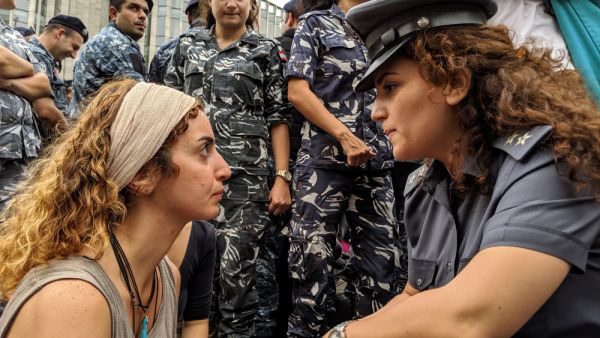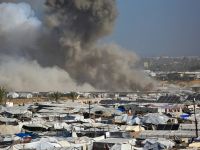The outgoing year will go down in Lebanon’s annals as one of the worst ever at all levels since the country gained independence from France in 1943, with multiple crises hitting the Lebanese hard, making their lives miserable and threatening them with poverty and even starvation.
On the eve of the New Year, 2020 can safely be dubbed the year of “frustrations” for the Lebanese at the political, economic, financial and health levels, as the crises-ridden country reeled from an economic meltdown, caused by decades of rampant corruption, mismanagement and waste of public funds. The economic crisis has been exacerbated by the massive Beirut Port explosion in the summer.
Adding to the misery of the Lebanese are mounting health hazards posed by an alarming and unchecked spike in coronavirus infections amid fears that authorities might be forced again to place Lebanon under a total lockdown in an attempt to curb the pandemic that has so far claimed the lives of over 1,430 and infected more than 175,000 people since the virus was first detected in the country in late February.
Driving in Lebanon: a form of contemporary art pic.twitter.com/VPNs1ZfInu
— ⵙ فستق حلبي (@filisteez) December 28, 2020
Worse still, as the Lebanese prepare to welcome the New Year after a year marked by disasters, tragedies, forest fires, the worst economic crisis since the 1975-90 Civil War that has led to massive layoffs, a crashing currency, a soaring inflation and rising unemployment rate, there is no glimmer of hope, or a light at the end of the dark tunnel, that the country would soon be put on the right track to begin tackling chronic political, economic and financial problems that have put Lebanon on the verge of a total economic collapse.
“There is no hope for this country as long as the entrenched political elite, largely blamed for the current crisis, corruption and mismanagement, remains in power. Unfortunately, last year’s popular uprising failed to topple the ruling elite,” said a disgruntled businessman, summing up the views of the majority of the Lebanese who have lost hope that rival political leaders can halt the country’s economic collapse or solve accumulated problems.
2020 began with big hopes pinned on hundreds of thousands of Lebanese who took to the streets on Oct. 17, 2019, in a nationwide popular uprising against the entrenched political class they accuse of corruption, mismanagement and squandering of public funds.
The popular revolt, unprecedented in the country’s turbulent history, gained overwhelming public support for its declared political and economic demands.
However, more than a year after the uprising, aside from the resignation of then-Prime Minister Saad Hariri’s government, none of the protesters’ major demands, such as the ouster of the political elite, an overhaul of the country’s sectarian-based ruling system, carrying out sweeping economic reforms -- including fighting corruption, holding early parliamentary elections and recovering billions of dollars in stolen and transferred money -- has been achieved.
In addition to internal divisions within the protesting groups, mainly civil society groups and student activists, and the lack of a unified leadership to maintain the uprising’s momentum, the outbreak of coronavirus last February weakened the revolt and forced a halt to street protests for health reasons.
Driving in Lebanon: a form of contemporary art pic.twitter.com/VPNs1ZfInu
— ⵙ فستق حلبي (@filisteez) December 28, 2020
The failure of the Oct. 17 uprising to bring about the long-awaited change in Lebanon’s political life and improve the deteriorating economic conditions was cited as a major frustration for the Lebanese.
Following the resignation of Hariri’s government under pressure of the uprising, Hassan Diab, a former education minister and a professor at the American University of Beirut, was designated to form a Cabinet made up experts and technocrats who do not belong to political parties.
Since forming a 20-member Cabinet on Jan. 21, Diab, an outsider of the political class, has voiced support for the protesters’ demands, promising to fulfill them. He also promised a new pattern of governance different from that of previous governments that had failed to resolve the country’s economic and political problems and implement reforms, a key demand of international donors.
However, Diab’s government, riven by internal divisions since its formation, has not taken any concrete measures to meet any of these demands, especially fighting corruption in the public administration or enacting key reforms needed to unlock billions of dollars in promised international aid to the cash-strapped country.
Overall, the performance and productivity of Diab’s government during its one-year stay in office were described by its opponents as very poor and frustrating for the Lebanese, who had expected it to be different from previous governments.
Despite his repeated vows not step down, Diab’s Cabinet resigned under the brunt of public outrage in the aftermath of the deadly Aug. 4 explosion that pulverized Beirut’s port, damaged half of the capital, killed nearly 200 people, injured thousands, left 300,000 people homeless and caused billions of dollars in material damage.
Although Diab’s Cabinet stayed in a caretaker capacity, Lebanon has been left without a fully functioning government for more than four months to face the series of multiple crises hitting the country.
Since the port disaster, France has emerged as the main power broker in Lebanon and has been leading diplomatic efforts for almost two years to persuade Lebanon to push through reforms and secure foreign aid needed to offset a financial meltdown.
French President Emmanuel Macron was the first foreign leader to visit Beirut two days after the port blast. He visited Beirut again on Sept. 1 and presented to Lebanon’s political leaders a French initiative designed to steer the country out of its crippling economic and financial crisis.
Among other things, the French blueprint calls for the quick formation of “a government with a mission” to implement a series of key reforms, including fighting endemic corruption, conducting a complete forensic audit in the Central Bank’s accounts, reforming the ailing electricity sector, which drains the cash-strapped state around $2 billion in annual subsidies, and restarting stalled negotiations with the International Monetary Fund on a $10 billion bailout package.
However, nearly four months later, the French initiative remains stalled as rival Lebanese leaders fail to agree on a new government to deliver reforms outlined in the initiative.
MP Loic Kervran, head of the Lebanese-French Friendship Committee in the French National Assembly, said after meeting President Michel Aoun Tuesday that the French initiative was still in place and France would not abandon Lebanon. Kervran reiterated France’s call for the formation of a new government as an essential condition to implementing the required reforms in order to acquire international aid, particularly through the CEDRE conference.
France hosted in 2018 the CEDRE conference, where international donors pledged over $11 billion in grants and soft loans to bolster Lebanon’s ailing economy and finance key infrastructure projects in Lebanon. However, the release of the promised aid was contingent on the implementation of a string of key and structural economic and fiscal reforms in Lebanon.
The French MP’s remarks come as the stalled Cabinet formation process has been put on hold until next year after Hariri’s two meetings last week with Aoun failed to make any breakthrough in the impasse.
Hariri has left Beirut to spend the New Year's holiday with his family abroad, a clear indication that nothing would happen in the government formation efforts before the start of 2021.
Hopes for breaking the Cabinet deadlock were pinned on Macron’s third visit to Lebanon, originally scheduled for Dec. 22-23, but the trip was canceled after the French president tested positive for COVID-19.
Another frustration came from the collapse of Maronite Patriarch Bechara al-Rai’s mediation efforts to facilitate the formation of a new government.
As part of his mediation bid, Rai met earlier this month separately with Aoun, Hariri and Free Patriotic Movement leader MP Gebran Bassil in an attempt to narrow differences between the president and the premier-designate over the shape and makeup of the next government.
But in Christmas speeches and sermons, Rai indirectly criticized Aoun and Hariri for not honoring their pledges to accelerate the formation of a government and by setting conditions and counter-conditions that have further complicated the process. Unfazed by the collapse of his initiative, Rai Sunday said he would continue his endeavor to break the Cabinet deadlock and warned those obstructing the government formation.
The formation of a new government to deliver reforms is urgently demanded by the international community, which has linked unlocking billions of dollars in promised aid to the country to the implementation of long-overdue reforms, mainly fighting endemic corruption and conducting a forensic audit of the accounts of the Central Bank and all ministries and public institutions.
However, Hariri’s attempts to form a proposed 18-member Cabinet of nonpartisan specialists to carry out reforms have foundered on rival factions’ jockeying for key ministerial seats, as well as lingering rifts with Aoun over the naming of Christian ministers and over who controls three sovereign ministries that deal with security: Defense, Interior and Justice.
In addition to refusing to grant veto power to any party in the next government, Hariri was also reported to have opposed allotting the Interior and Justice ministries to Aoun and the FPM.
“2020 ends with a major frustration for the Lebanese who were promised a new government before Christmas,” a political source said.
This article has been adapted from its original source.








